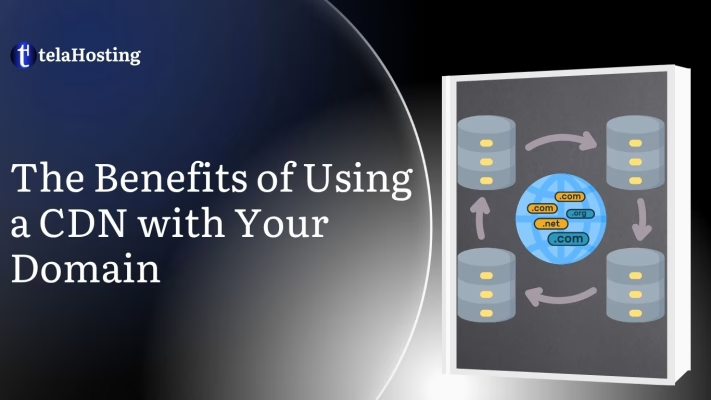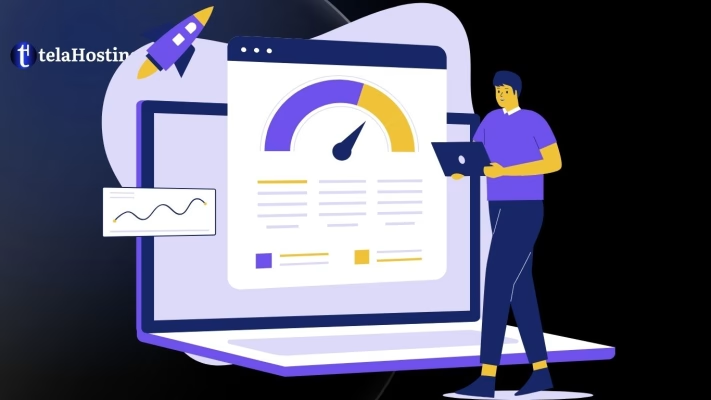
Let’s say you’re in Abuja, and you’re browsing your phone, trying to buy that cool new gadget or read a trending blog post. But the website just won’t load. You tap, swipe, and probably move on to another site. Sounds familiar, right? That’s exactly what happens to visitors when your website drags. And that’s exactly why I’m excited to talk to you about Content Delivery Networks (CDNs)—your secret weapon for creating blazing-fast, secure, and reliable websites, especially here in Nigeria where internet connections can be… let’s say, unpredictable at times.
In Nigeria, where we’re seeing explosive growth in internet penetration (thanks to affordable smartphones and better data plans), more people than ever are shopping online, reading blogs, booking services, and connecting with brands. But if your website isn’t performing well, they won’t stick around. That’s where a CDN steps, making sure your domain serves content faster and safer no matter where your visitors are.
So, whether you’re running a personal blog, a small online store, or a large e-commerce platform, I’m going to break down for you exactly how a Content Delivery Network can transform your site’s performance, help your SEO, protect your data, and save you costs. Ready? Let’s go!
What is a Content Delivery Network (CDN)?
Okay, let’s break it down nice and easy. Imagine you own a bakery (stay with me here!). People from all over town want to buy your delicious bread. But your shop is located in just one spot.
That means folks living far away have to travel a long way to get to you—and sometimes, by the time they get there, they’re tired or give up. Now, what if you had smaller branches spread across town, so your customers could simply visit the one closest to them? That’s what a CDN does for your website.
A Content Delivery Network is basically a group of servers placed in different locations around the world to deliver website content to users faster and more efficiently.. When someone visits your website, instead of pulling information all the way from your main server (which could be located far away—say, in Europe or the U.S.), the Content Delivery Network delivers it from the server closest to your visitor. The result? Your pages load faster, your visitors are happier, and you don’t lose business.
Here’s a quick table to illustrate how it works:
| Without CDN | With CDN |
| All visitors connect to your main server | Visitors connect to the nearest CDN server |
| Longer load times, especially for distant visitors | Shorter load times, regardless of location |
| More strain on your main server | Load is shared among multiple servers |
Cool, right? And the best part? You don’t need to be a tech wizard to benefit from a CDN. Let’s dig a little deeper into how this magic works with your domain.
How Does a CDN Work with Your Domain?
Your domain is like the front door to your shop. When people type it in, they’re trying to enter and look around. But if your shop is cluttered or your door sticks (because your site loads slowly or crashes), they’ll walk away.
When you connect your domain to a Content Delivery Network, here’s what happens:
- Your domain points to the CDN’s network rather than just your single web server.
- When a visitor comes knocking, the Content Delivery Network figures out the fastest route and the nearest server to serve your content.
- Images, videos, and even code files are delivered super quickly.
- The CDN handles traffic spikes like a pro, so your site doesn’t crash when you suddenly get popular (or during sales, promotions, etc).
I’ll give you a real-life example: I once helped a friend who runs an online store for Ankara fabrics. She had issues during major sales, site crashes, slow checkouts, angry customers. We added a CDN, and guess what? The next sale went smooth as butter, and she made twice as much because people could actually complete their orders.
So yes, pairing your domain with a CDN is like hiring the best delivery team in town, ensuring every customer gets served fast and well.
Benefits of Using a CDN with Your Domain in Nigeria
The benefits you’ll get when you use a CDN with your domain. Trust me, it’s more than just “making your site faster.” Here’s what’s in it for you:
1. Faster Load Times

Speed is king. Nigerian internet users are busy, mobile-first, and always on the move. If your site lags for even a few seconds, most visitors will bounce. Studies show that just a 1-second delay in page load time can reduce conversions by 20%. Ouch, right?
With a CDN, your content gets delivered from a server closest to the user, which means minimal delay. Even if someone’s browsing your site from Maiduguri or Port Harcourt, they get a snappy experience. And trust me, faster sites don’t just make your visitors happy, they make Google happy too.
Here’s a handy table showing how load time affects bounce rates:
| Page Load Time (Seconds) | Bounce Rate (%) |
| 1 | 7 |
| 3 | 20 |
| 5 | 38 |
| 10 | 65 |
The numbers don’t lie. The faster your site, the more people stay, browse, and—most importantly—buy! A Content Delivery Network isn’t just about speed; it’s about keeping your visitors happy and engaged.
And here’s a little story to take it home: A client of mine runs an online gadget store in Lagos. Before using a CDN, they got tons of abandoned carts—people would add products but leave because checkout was too slow. After setting up a Content Delivery Network, checkout speeds improved dramatically, and their sales increased by 30% within the first month. Speed sells. Period.
2. Improved User Experience for Visitors

You’ve probably left a website before because it was just too slow, right? Maybe it took forever to load, images were broken, or the checkout page kept freezing. Frustrating, isn’t it? Now flip the script. Imagine your visitors having that same experience on your website. That’s exactly what you want to avoid. And this is where a Content Delivery Network (CDN) comes in like a game-changer.
A CDN helps create a smooth, seamless experience by ensuring that your website’s content, whether it’s text, images, videos, or interactive elements—loads quickly and without hiccups. How? By delivering that content from the server that’s closest to your visitor’s location.
The result? No more endless spinning loaders, no missing images, no pages that time out or crash during busy periods. Just clean, fast access to your site’s content, every single time.
And when your site just works, people feel it. That satisfaction keeps visitors on your site longer, encourages them to browse more pages, and makes them much more likely to trust you and come back again. Whether it’s an online shopper trying to buy a product, a reader enjoying your blog, or a client looking to book your service, a snappy site leaves a positive impression.
I once had a client tell me their customer actually emailed them saying, “Your site is so easy to use—I’ll definitely shop here again.” That’s the power of a great user experience, and a Content Delivery Network helps you deliver it consistently.
3. Better SEO Rankings

If you want to get noticed on Google, speed and reliability are two factors you simply can’t ignore. Google’s algorithm prioritizes websites that load fast and provide a stable, reliable experience. Why? Because Google’s mission is to serve up the best, most helpful results to users, and nobody likes a slow or unreliable website.
By speeding up your load times, a CDN gives your site a major SEO advantage. Remember: page speed is a ranking factor. When your site loads faster, Google is more likely to rank it higher in search results. And it doesn’t stop there. When your site loads quickly, visitors tend to stick around longer, click through more pages, and engage with your content.
This lowers your bounce rate. A lower bounce rate tells Google that people find your site useful and worth spending time on, another tick in your SEO favor.
with a CDN, your content gets served from multiple locations, which can improve your site’s global and regional SEO performance. This is a big deal if you’re targeting not just Nigeria but also customers abroad. And even if you’re focused purely on the Nigerian market, you’re ensuring that people browsing from all corners of the country, whether in Lagos, Kano, or Calabar, get the same speedy, seamless experience.
And let’s not forget uptime. A Content Delivery Network helps ensure that your site stays online even during big traffic surges (like during a promo or viral blog post). Google notices this stability too. So, with a Content Delivery Network, you’re not just improving your visitors’ experience, you’re also telling search engines, “Hey, this is a quality site. Rank me higher!”
4. Enhanced Security Features

The online world isn’t always friendly. Every day, websites big and small face threats like hackers, spammers, and DDoS attacks (that’s when cybercriminals try to overwhelm your site with traffic and crash it). These attacks can harm your reputation, steal customer data, or even take your website offline. But guess what? A CDN is like having a bodyguard at your digital front door.
Many CDN providers offer built-in security features designed to protect your website. These include:
-
DDoS protection, which helps block and absorb malicious traffic before it can crash your site.
-
SSL encryption, ensuring data between your site and your visitors is safe and private. That’s the little padlock you see in your browser address bar.
-
Bot filtering, to keep out fake traffic that can skew your analytics or try to hack your login forms.
-
Web Application Firewalls (WAF), adding another shield against hackers trying to exploit vulnerabilities on your site.
The result is peace of mind for you and trust from your visitors. When people see that padlock or feel safe on your site, they’re more likely to share their personal info, make purchases, or engage with your content. A secure site builds confidence, and in today’s world, confidence is currency.
5. Cost Savings on Bandwidth

Hosting a website comes with costs, and one of the biggest hidden costs is bandwidth. That’s the data your server uses every time someone visits your site and loads content. The more visitors you have, or the heavier your content (think images, videos, files), the more bandwidth you burn through.
With a CDN:
- Much of that content is served from the CDN’s servers, not yours.
- This means your bandwidth usage drops significantly.
- Your hosting server stays healthy and doesn’t need expensive upgrades to handle high traffic.
And if you’re on a hosting plan that charges for bandwidth or has limits, those costs can add up fast, especially during traffic spikes. So, instead of making your main server do all the heavy lifting, a Content Delivery Network offloads much of that work. It caches (stores) and delivers your content from its own network of servers, reducing the amount of data your origin server has to send.
That means lower bandwidth usage on your hosting account and more naira left in your pocket.
A CDN helps you scale your site’s performance without scaling your costs. I worked with an online retailer who saw their bandwidth usage drop by over 60% after setting up a Content Delivery Network, and that translated into major savings on their hosting bill. Imagine what you could do with those savings—invest in marketing, improve your site further, or grow your business in other ways.
The CDN Advantage for Businesses in Nigeria
Why is a CDN especially important for businesses in Nigeria? That is because our digital economy is booming. From Lagos to Kano, more businesses are going online, and more consumers are using their phones to shop, book services, and interact with brands. But with that growth comes challenges such as slower connections in some regions, patchy network coverage, and the ever-present threat of cyber attacks.
That’s where a CDN becomes your silent partner in success. Whether you run a small fashion boutique, an online electronics store, a blog, or even a corporate website, a Content Delivery Network helps you:
- Serve customers faster, no matter where they are in Nigeria.
- Stay online during peak traffic (like Black Friday sales or promo events).
- Protect your data and customer information from cyber threats.
- Build trust with visitors who expect speed and security.
I once worked with a small Nigerian travel agency that focused on local tours. Before adding a CDN, their site would crash every time they ran a promo. After setting up a Content Delivery Networks? They handled 5x more traffic without a hitch—and bookings doubled.
No matter the size of your business, a Content Delivery Networks helps level the playing field, letting you compete with bigger players by offering the same fast, smooth, and secure experience.
Choosing the Right CDN for Your Domain
Now you’re probably wondering: how do I choose the right Content Delivery Networks for my website? Great question. The good news is, there are plenty of options that work well for Nigerian businesses. But here’s what you should look for:
- Global network coverage with African presence: You want a Content Delivery Network that has servers close to your audience. Some top CDNs have servers in Africa or nearby regions that ensure low-latency delivery.
- Easy integration with your hosting provider: Whether you’re using telaHosting or another Nigerian host, choose a Content Delivery Network that plays nice with your existing setup.
- Built-in security features: Look for Content Delivery Networks that offer DDoS protection, SSL, bot filtering, and a Web Application Firewall (WAF).
- Affordable pricing: Some CDNs offer free tiers (like Cloudflare’s basic plan) that are great for small sites, while others charge based on traffic. Make sure you pick what fits your budget.
- Good support and documentation: Trust me, you want a Content Delivery Network provider that will help you if something goes wrong.
Here’s a quick comparison of some popular CDNs:
| CDN Provider | Free Plan? | DDoS Protection? | Good for Nigerian sites? |
| Cloudflare | Yes | Yes | ✅ |
| AWS CloudFront | No (pay-as-you-go) | Yes | ✅ |
| Google Cloud CDN | No (pay-as-you-go) | Yes | ✅ |
| Bunny.net | Affordable paid plans | Yes | ✅ |
How to Set Up a CDN with Your Domain
Setting up a CDN might sound techy, but it’s really not that hard, especially if you follow these simple steps:
- Sign up for a CDN service: Create an account with the Content Delivery Network provider of your choice (many offer easy, step-by-step guides).
- Add your domain: You’ll typically enter your domain name (e.g., yourbusiness.com.ng) into their dashboard.
- Update your DNS settings: This is the part where you tell the internet that your domain should now route through the CDN. Your CDN provider will give you new nameservers or CNAME records to add at your domain registrar.
- Configure your settings: Turn on features like caching, SSL, DDoS protection, and any other goodies your CDN offers.
- Test your site: Make sure everything works smoothly and that your site loads faster from different locations.
Pro tip: Always back up your site and DNS records before making changes. And if you’re using telaHosting, our support team can help walk you through the process!
And here’s a common pitfall to avoid: Don’t just “set it and forget it.” Check your Content Delivery Network analytics from time to time to see how it’s performing and whether you can change settings for even better results.
Real-Life Success Stories
Let me share two quick success stories that might inspire you:
✅ An Abuja-based e-commerce startup: They were struggling with slow load times, especially for customers in other parts of the country. After adding a CDN, their bounce rate dropped by 40%, and sales increased by 25% in just two months.
✅ A Nigerian lifestyle blogger: Frustrated by slow speeds and rising hosting costs, she added a free-tier CDN (Cloudflare). Not only did her site load faster, but her Google rankings also improved, and she started seeing more organic traffic.
Conclusion
If you’ve read this far, I hope one thing is clear: a CDN is no longer optional, it’s essential. Whether you run a small blog, an online shop, or a corporate site, pairing your domain with a good CDN will help you load faster, stay safer, save costs, and rank better on Google.
So what’s next? I encourage you to explore CDN options today. Don’t wait until your next traffic spike crashes your site or until a hacker comes knocking. Be proactive, give your visitors (and your business) the speed, security, and reliability they deserve.
And if you’re hosting with telaHosting, reach out—we’re always here to help you make the right CDN choice for your domain!
FAQ
1. Is a CDN only for big companies?
Not at all! In fact, small businesses often benefit the most because they usually don’t have huge budgets for expensive servers or IT staff. A CDN helps you punch above your weight, offering the same performance and security as big companies.
2. Can I use a CDN if my audience is mainly in Nigeria?
Absolutely! Many CDNs serve content efficiently to Nigerian visitors by using servers in nearby regions (like South Africa, Europe, or Middle East). The speed boost is still noticeable, even for local traffic.
3. Will a CDN slow down my site?
Quite the opposite! A properly configured Content Delivery Network will speed up your site, not slow it down. The only time a CDN might cause issues is if it’s set up incorrectly—but that’s easy to avoid if you follow setup guides or ask your provider for help.
4. Is it hard to set up a CDN?
It’s easier than you think. Most Content Delivery Network providers offer clear instructions, and if you’re using telaHosting, our team can assist. It’s usually just a matter of updating your DNS settings and clicking a few options in the CDN dashboard.
5. What’s the best CDN for small businesses in Nigeria?
Cloudflare’s free plan is a great starting point for small businesses. Bunny.net is another affordable option with solid performance.
6. Are CDNs worth it for personal blogs?
Yes! Even personal blogs gain faster load times, better SEO, and improved security from using a Content Delivery Network—and many options are free or low-cost.